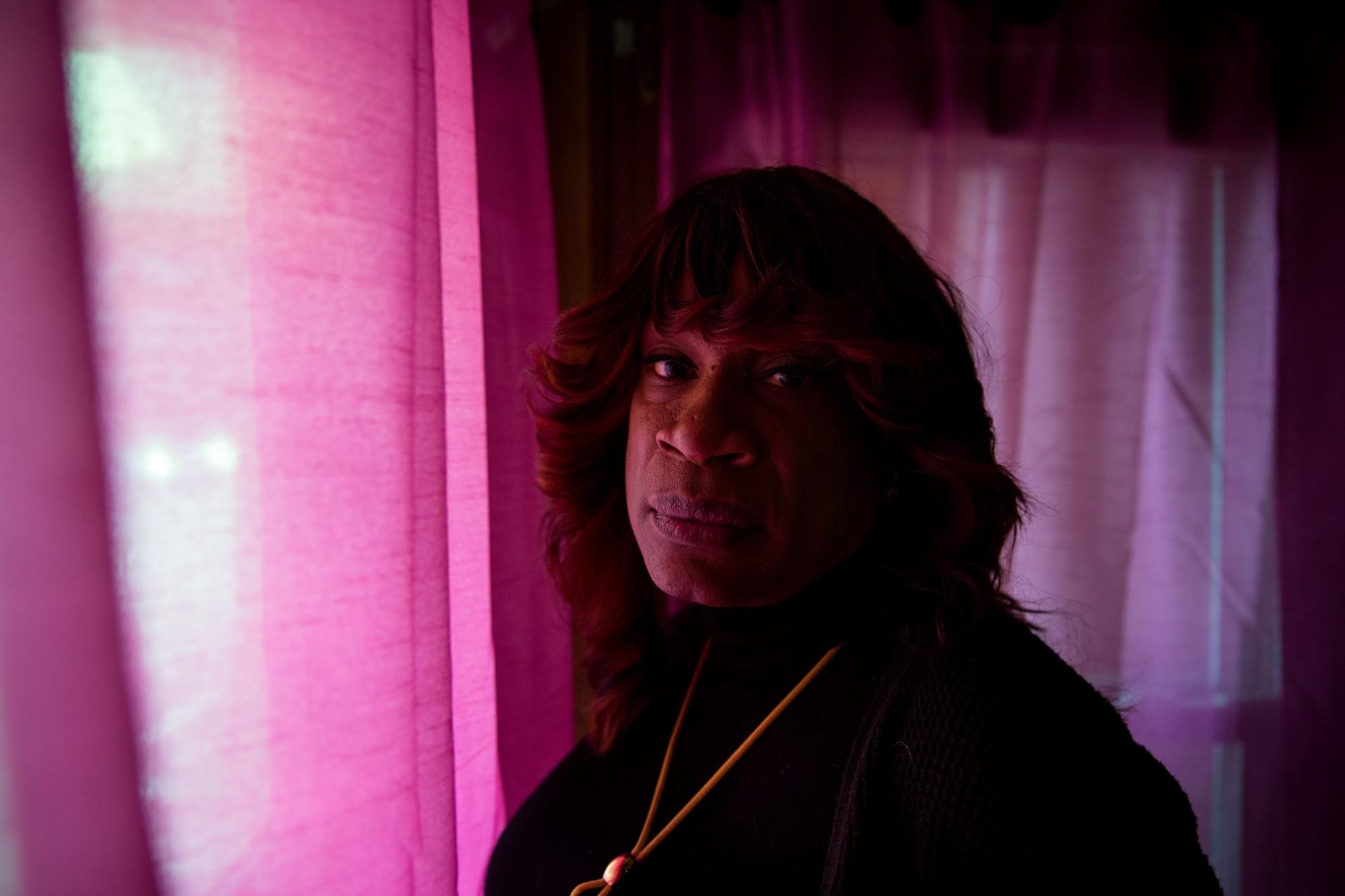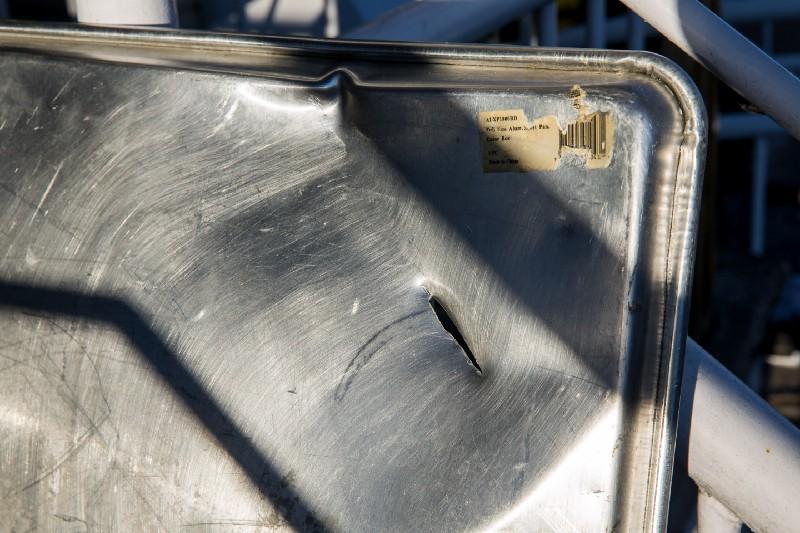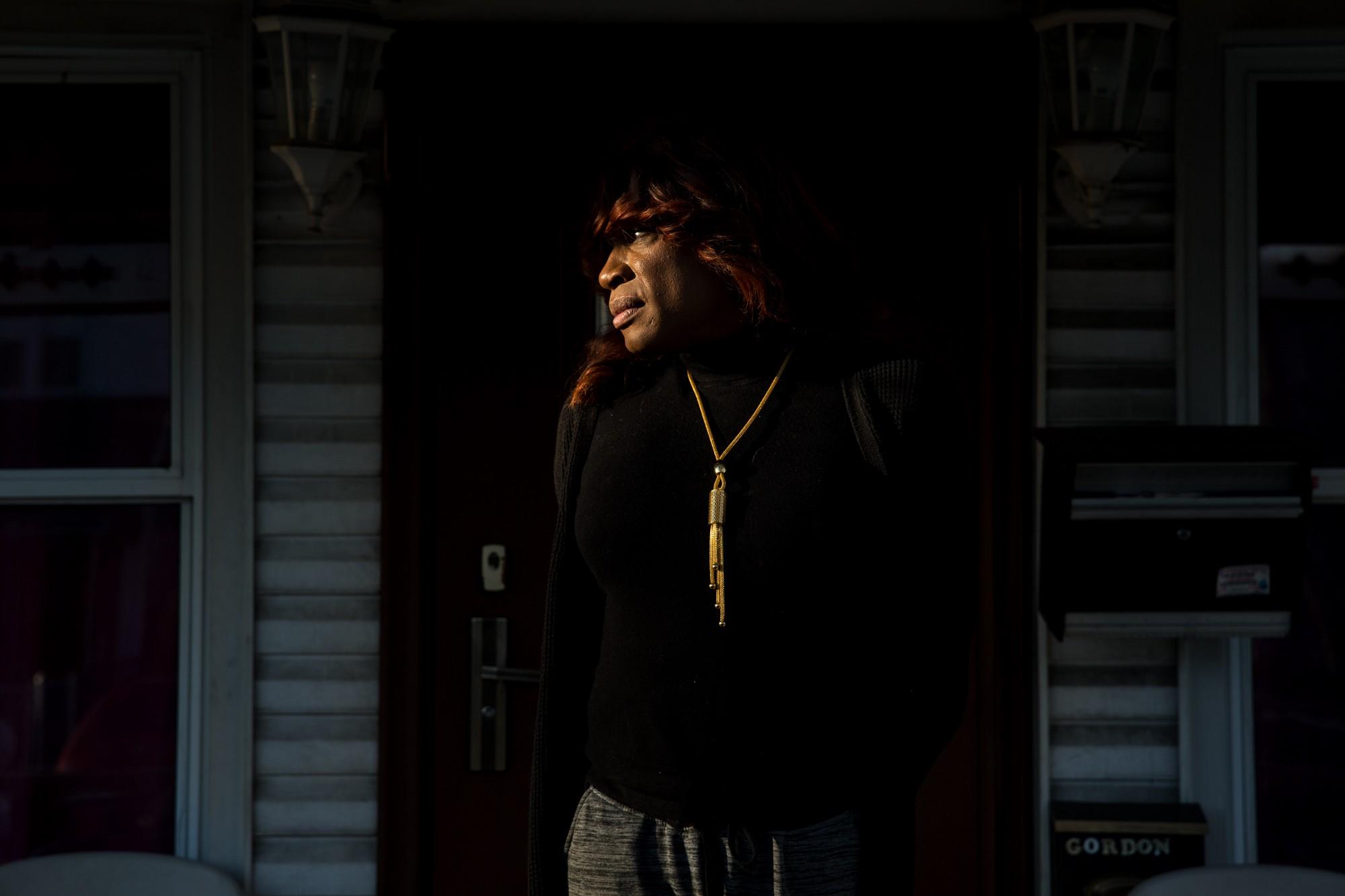NYC Transgender Activist Says She Was Criminalized For Defending Herself Against Abuser
Her former partner assaulted her in her home. When the police arrived, she was arrested and he walked free.

When Ceyenne Doroshow, an activist for transgender and sex worker rights, arrived at Queens Criminal Court for a hearing on February 15, more than a dozen supporters greeted her, some holding signs with slogans like “Black Trans Women Matter.” But that’s not, she says, how the criminal justice system has made her feel.
Doroshow, 52, says, John*, her former partner, assaulted her in her home on December 19, 2017. Yet, when the police arrived, Doroshow was arrested and John walked free. “He has been doing this to me for years,” Doroshow told The Appeal. She explained that John had not only abused her, but trafficked her as well. “But it always looks bad when a transgender person has to defend herself against a man. Somehow we get targeted or criminalized.”
Queens Judge Toko Serita issued Doroshow an adjournment in contemplation of dismissal (ACD) that February morning on charges of assault, harassment and weapon possession, plus a six-month order of protection requiring her not to interact with John.
Doroshow’s lawyer, Cate Carbonaro of the Legal Aid Society, said she was disappointed because she had sent “detailed accounts of [John’s] trafficking and abuse” to the Queens district attorney’s office. “I hoped the DA would dismiss the case outright and that I could help them to see that an order of protection against Doroshow was not necessary,” she said.
“The DA’s office clearly was not on the same page as us and were not believing what we were telling them,” she added, “that this was all self-defense.”
Police mishandled the situation
Doroshow has Farrah Fawcett bangs and peppers her conversation with warm “sweeties.” She recounted the December incident from her dining room table in Forest Hills a few days before her hearing. Sparky, a white lap dog, lay on the floor, twitching occasionally in her sleep.
On December 18, Doroshow attended a fundraiser for a documentary about the trans activist Monica Jones, in Soho. Afterwards, she said, she and a group of friends went to The Monster, a West Village gay club. Her roommate, Lee Quan, and Quan’s date, Jerrell Buggs, were there, as well as John and his nephew. At one point in the evening, John and his nephew returned to Doroshow’s apartment. When she arrived home hours later with Quan and Buggs, she says, music was blasting from her stereo. John was on the couch, intoxicated. Doroshow turned off the music and then, both Doroshow and Quan say, John lunged at her.
“He socked her in the face,” Quan told The Appeal. A scuffle ensued, and at one point John allegedly attempted to stab Doroshow with a kitchen knife, insteading striking and piercing a cake pan. “I saw her shielding herself with the cake pan,” Quan said.

According to Doroshow and Quan, John attacked Buggs, too. (Buggs was also issued an ACD and order of protection on February 15. His attorney declined to comment for this story.)
Police from the 102nd precinct responded to a 911 call about an argument at Doroshow’s address at 5:10 a.m., according to a spokesperson for the department. Doroshow assumes a neighbor heard the noise and called the police. A criminal complaint states that Doroshow and Buggs allegedly “engaged” John in a verbal argument. Doroshow then allegedly punched, kicked and scratched John, while Buggs punched him and hit him with a wooden chair (hence the weapon charges). John sustained bruising on his body and a laceration to the head, according to police.
But Doroshow sustained injuries as well. “The police transported her to the hospital, so they clearly knew about her injuries,” Legal Aid attorney Carbonaro said. “She had a black eye and scratches and bruises on her face.”
Quan told The Appeal that he was surprised by the police officers’ deference to John’s account of what happened. Quan was also troubled by language John used in front of the police, which he says included homophobic slurs like “faggot” and “sissy” directed at Doroshow. (Attempts to reach John for comment were unsuccessful.)
“The shit coming out of his mouth, my neighbors had no business hearing,” Doroshow recalled. Meanwhile, the police allegedly misgendered Doroshow, repeatedly calling her “sir,” according to Quan.
“Had I been a biological woman, [John] would have been in jail,” Doroshow said. She recalls police transporting her to nearby Jamaica Hospital, where she was handcuffed to her bed. Doroshow was “freezing” while in police custody, she said, and was not offered food for over 24 hours. She wore thin footie pajamas. According to Carbonaro, she was arraigned without shoes on the afternoon of January 20. The NYPD declined to comment on these allegations of mistreatment.
“The funny thing is, I’m broken by it,” Doroshow said in February. “It really, really hurts. I still have nightmares about this night. Sometimes I think about it and I can’t eat.”
Carbonaro believes the DA’s office unfairly discounted evidence she supplied. “I had a number of conversations with the Queens ADA assigned to prosecute this case,” she said, regarding John’s history of exploitation and Doroshow’s injuries the night of her arrest.
The NYPD also confirmed Doroshow’s hospitalization that night to The Appeal. Yet in a statement, a spokesperson for the Queens district attorney claimed that “the victim in this case was the only person to suffer any injuries.” She added that the office looked into “any criminal history of the complainant” but “did not find anything,” and “requested information about potential witnesses, but those names were not provided.”
Carbonaro countered that she was in the process of gathering witness information when the office informed her they would offer an ACD and a protective order, and that “a review of the evidence … would not lead to a change in their position.”
Doroshow’s case is hardly unusual. Research shows that transgender people have a high incidence of abuse by domestic partners, and that the criminal justice system often fails to protect them.
“Police are not trained for the nuance that might exist in trans relationships,” said Shelby Chestnut, national organizing and policy strategist for the Transgender Law Center. “If you look around at the number of homicides [of trans people] that have happened in the last several years, many are intimate partner violence, and oftentimes it’s a cis male partner.”
In 2017, the National Coalition of Anti-Violence Programs documented a record number of anti-LGBTQ murders, the highest in its 20 years of reporting: 52. Of those, 27 victims were transgender, and 22 were trans women of color. According to the 2015 U.S. Transgender Survey, 54 percent of trans people experience intimate partner violence at some point in their lives.
In Doroshow’s case, according to her attorney, John coerced her into doing sex work for his profit. He was also mentally abusive and physically harmful. “It’s been a long history of abuse,” Doroshow told The Appeal. “A very long history. Even when I got away, he still kept coming, demanding, being bossy.”
Melissa Broudo, co-director of the Sharmus Outlaw Advocacy and Rights (SOAR) Institute, a nonprofit advocacy group for the rights of sex workers and trafficking victims where Doroshow also serves as a community advisor, says trans women are particularly susceptible to violence and trafficking by an abusive partner. “The social stigma and marginalization and shaming really leave you open to people taking advantage,” she said.
And police interactions sometimes add to the harm. The 2015 U.S. Transgender Survey found that 58 percent of trans people who interact with police report mistreatment, ranging from verbal harassment and misgendering to assault.
On February 8, New York City First Lady Chirlane McCray announced a new hotline and online resource center for victims of domestic violence, coinciding with a public awareness campaign focused on diversity. “We know that no gender, ethnicity, or social class is unaffected by this very personal type of violence,” she said.
But Catherine Shugrue dos Santos, co-director of client services at the New York City Anti-Violence Project, the city’s only LGBTQ-specific service provider for victims of intimate partner violence, says, in practice, “anyone who falls outside that paradigm that says cis straight men abuse cis straight women is left out.”
Red S. is an organizer with Survived and Punished, a national grassroots coalition of anti-violence and prison abolition groups. Survived and Punished provided court support for Doroshow, whom they see as just the latest victim of a criminal justice system that applies the “victim” label selectively. Their group has also organized around Bresha Meadows, a 14-year-old who was incarcerated from July 2016 until early this month for killing her abusive father.
“We cannot afford to play into the perfect victim narrative,” Red told The Appeal. “We have to own our complicated, trauma-filled lives, and we have to support people when they have to use violence.”

he assault, her arrest, and prosecution interrupted what Doroshow describes lovingly and emphatically as “the work.” Two years ago, she launched Gays and Lesbians Living in a Transgender Society, which offers assistance with healthcare, housing and education to transgender sex workers, nationally and globally. Services can be as specific as a new outfit for a job interview, or a last-minute bus ticket away from a dangerous situation.
Doroshow also serves on the boards of numerous nonprofits, including the Caribbean Equality Alliance. She’d like to see trans people develop sensitivity training for police departments, and train themselves in self-defense.
“We have … to train ourselves to protect ourselves,” she said.
With the order of protection in place against her, Legal Aid attorney Carbonaro says Doroshow is “the only one that gets in trouble if [John] calls the police on her. And so she really needs to protect herself. She’s so afraid to leave her house.”
Standing outside the courthouse in Queens after Judge Serita issued her ACD, Doroshow seemed somewhat relieved, asking her assembled friends for a cigarette. But she emphasized that she’s still on high alert.
“My abuser actually is protected,” she added. “In some kind of way, the system still failed me. I’m not safe at all.”
